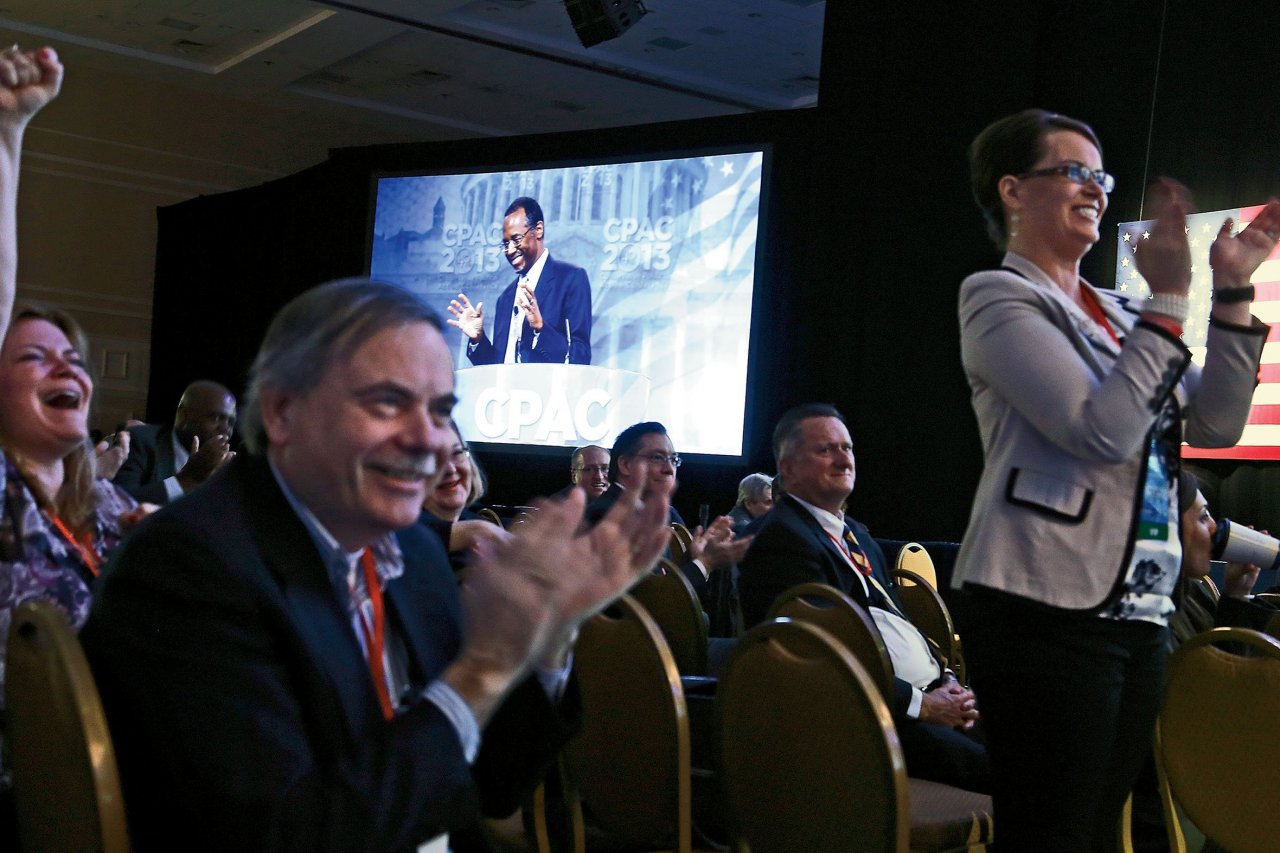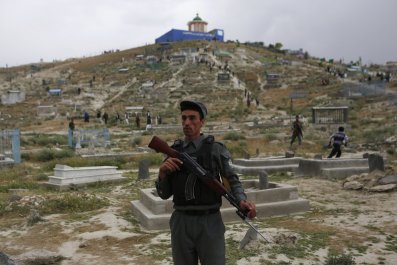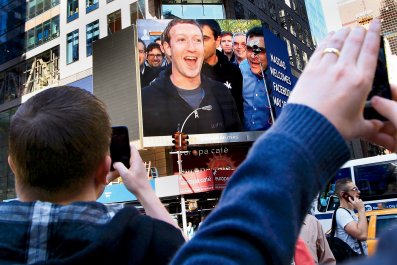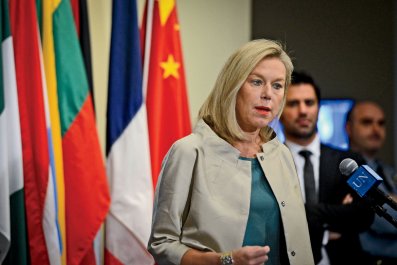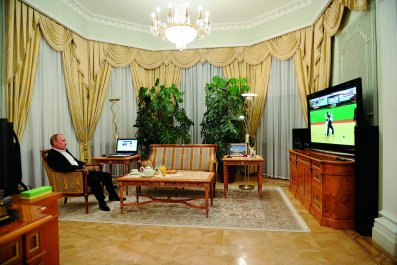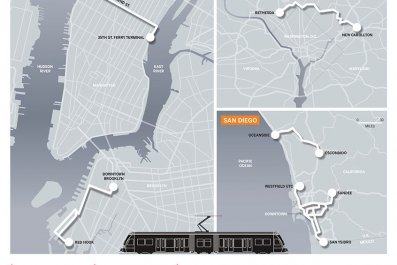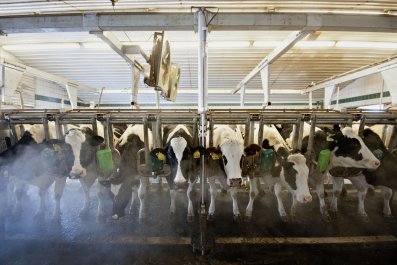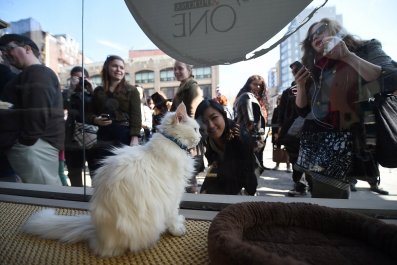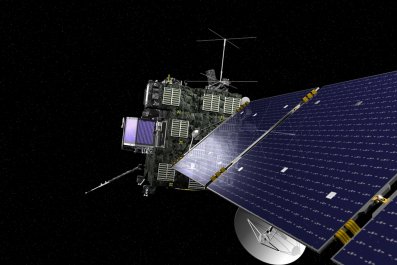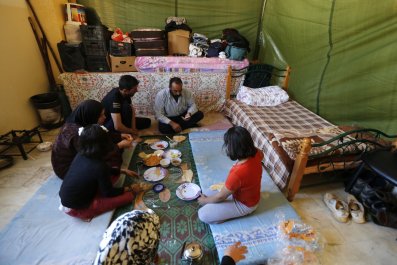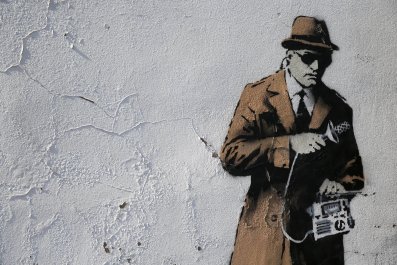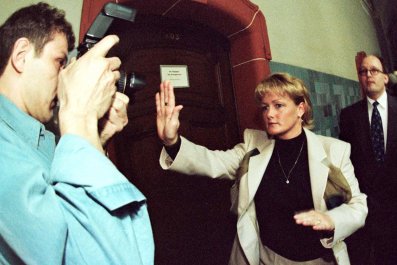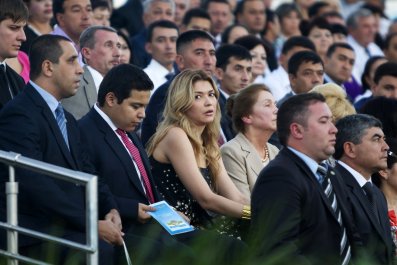The official word from Dr. Benjamin Carson, the pioneering Johns Hopkins University brain surgeon who electrified conservatives with his speech at last year's National Prayer Breakfast, is that a decision on whether he will enter the 2016 presidential race is between him and God.
"I have not felt called to run," he writes in his new book, One Nation. "Nevertheless, if I felt called by God to officially enter the world of politics, I certainly would not hesitate to do so."
Get Carson on the phone, though, and you get the sense it is going to require something considerably less momentous than divine intervention to lure him into the campaign. "Every place I go, people are saying I got to do this," he tells Newsweek. "I certainly can't just turn my back on my nation that is in so much trouble."
If Carson does run, will he be a Republican Barack Obama, a relative newcomer to politics who comes out of nowhere to win? Or will he be another Herman Cain, an intriguing nonpolitician who heats up for a while, but then flares out?
Though it is early, the signs for a Carson campaign are encouraging. He tied for third place in a recent Republican straw poll in the early primary state of New Hampshire, finishing ahead of Jeb Bush, Marco Rubio and Ted Cruz.
Among the activists who attended the Conservative Political Action Conference earlier this year, Carson polled ahead of governors Chris Christie, Scott Walker, Rick Perry, Mike Pence and Bobby Jindal as a presidential preference; he also outranked Representative Paul Ryan of Wisconsin.
The National Draft Ben Carson Committee, led by John Philip Sousa IV, a great-grandson of the composer of patriotic marches, has already raised a reported $4 million to spend on hiring regional directors and airing ads on cable television.
Carson insists that he hopes a campaign is unnecessary and that some other candidate will arise who "clearly understands the Constitution" and can advance a message of personal freedom and personal responsibility while avoiding partisan divisiveness.
The 62-year-old says he retired from practicing medicine intending "to relax." He muses about the visible signs of aging on the faces of recent presidents. "Who would want that job?" he asks. "It's a lot of tension."
If and when Carson does get into the race, his positions may surprise some conservatives. He opposed the wars in Iraq and in Afghanistan, telling Newsweek that he would have responded instead to the terrorist attacks of September 11, 2001, with "a Kennedy-esque moment," launching a "national project" to become petroleum independent. "The terrorists would have had their funds dried up," he says.
He says that getting rid of Saddam Hussein was "a worthwhile thing," but he would have preferred to do it without an American invasion of Iraq. As for Afghanistan, he says, "You can't tame a nation that doesn't have a central government."
Though Carson doesn't dismiss the dangers of Islamist terrorism, he's cautious about American involvement overseas and troubled by what he sees as the excesses of the National Security Agency's secret wiretapping and data collection programs. "We need to be open and transparent," he says.
Asked whether Obama has gone too far in cutting military spending, Carson responds, "It's not just the military that needs to be cut. Everything needs to be cut, across the board.… Believe me, there is fat in everything."
Carson also parts ways with Republicans who want to tackle Social Security and Medicare spending immediately. "Entitlement reform may be an appropriate topic at some point," he allows, but he's not sure that now is that moment, preferring instead to jump-start economic growth through tax reform and pared back regulations. When the time does come for entitlement reform, he says, "it needs to be done in a way that is kind."
On immigration, another issue on which Republicans are divided, Carson would give those already in America illegally the chance to register for a guest worker program. If they want permanent status, they would need to "get in line like everybody else."
On monetary policy, an issue that resonates for many backers of Senator Rand Paul of Kentucky, another 2016 Republican presidential hopeful, Carson acknowledges that "we don't really have a solid basis for our dollar." Asked about reviewing the role of the Federal Reserve, he says it would be difficult to do immediately, but "I definitely think we need to start looking."
On gay marriage, Carson, in his book, likens its proponents to "a new group of mathematicians who claim that 2 + 2 = 5." He also writes, though, that he sees no reason why any two consenting adults cannot join "in a legally binding civil relationship that provides hospital visitation rights, property rights, and so on without tampering with the definition of marriage."
In a chapter of the book on "bigotry," in a section headed "homophobia," he faults "the assumption by many on the Right that gays should not have access to children." There's no evidence that gays are more likely to abuse children, he writes.
While denouncing bigotry, he also criticizes political correctness and "faux hypersensitivity" of the sort that led him to withdraw as a Johns Hopkins commencement speaker in 2013 after "secular progressives" tried to paint him, he writes, "as a homophobe who thinks that gay marriage is equivalent to bestiality. Nothing could be further from the truth."
Carson's appeal, though, is based less on checking the boxes on a list of issues than it is on his potential as a unifying figure reminiscent of the Barack Obama who gave the keynote speech at the 2004 Democratic National Convention and spoke of how "there is not a liberal America and a conservative America—there is the United States of America."
"The main thing is that we, the American people, are not each other's enemies," Carson says. Our main enemies, he says, are those who think they can divide us. There's an entire chapter in One Nation on "The Art of Compromise," and another on "Respectful Disagreement."
The chapters conclude with "action steps," such as "If engaged in a pointless argument, change the subject to something about which there is agreement"; "Try to identify some national politicians who are humble"; and "Check on an elderly relative or friend this week."
Carson is a physician, not a career politician, which can both help and hurt him. If Obamacare is a big election issue in 2016, a candidate with medical credentials could be a plus. The medical doctors in recent presidential campaigns—Howard Dean, Ron Paul—gained traction, but never enough to win.
Nonpolitician candidates—General Wesley Clark, businessmen Ross Perot and Herman Cain, consumer advocate Ralph Nader and civil rights leader Jesse Jackson—have gained attention and in some cases helped to influence outcomes, but have fallen short of victory.
Carson's ideological profile would give him an opening to run as an independent if the Republicans choose another candidate. If nothing else, a Ben Carson in the 2016 presidential field would make the race more entertaining, reducing the chances of a Bush-Clinton spin-off.
Republicans, in backing a black candidate raised in poverty by a single parent with a third-grade education, will have an opportunity to disprove the caricature, commonly drawn by the left, that the party is a collection of racist country-club types. And if Carson, with his quotes from Proverbs, strikes some as naïve or hokey, others may find his style preferable to the alternative: cynicism.
Carson talks about the contrast between the "can-do-attitude" of America at its best and the "what can you do for me attitude" of subservience. It's an updated version of President John F. Kennedy's "Ask not what your country can do for you, ask what you can do for your country."
He writes about his jobs earlier in his career, as an X-ray technician, a bank teller, a school bus driver, a supervisor for highway cleanup crews and a crane operator in a steel factory.
We're a long way yet from seeing whether Carson's can-do attitude translates into his adding president to that list of jobs that some might consider undesirable. But we're getting closer by the day to seeing whether he will feel called to give it a try.
One Nation by Benjamin Carson is published by Sentinel ($25.95).



